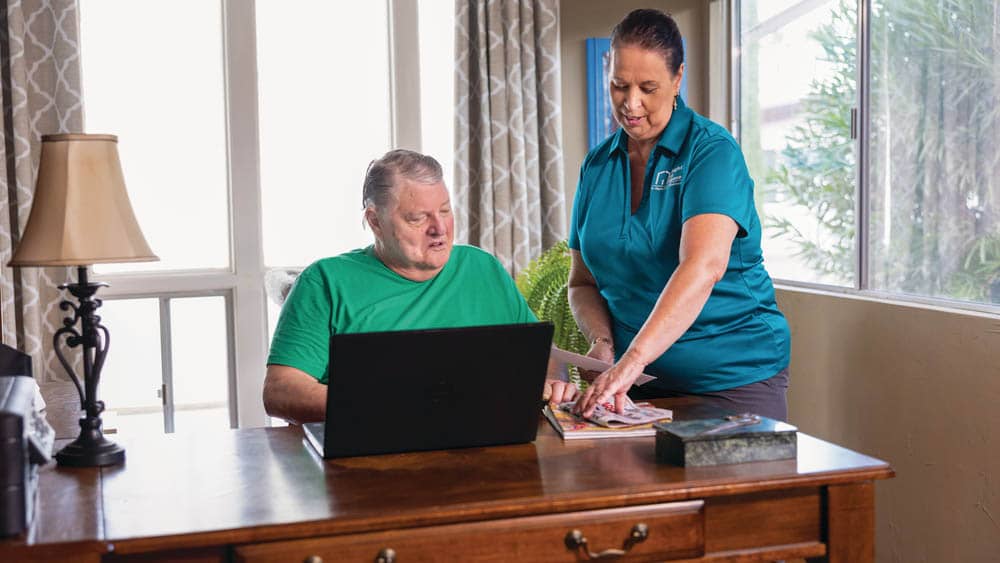

Senior Scammers: How To Avoid and What To Do if You Fall Victim
Nobody wants to believe they can be swindled, but in this digital age, there is a multitude of ways thieves can obtain personal information. Methods include remote hacking, deceptive pop-up ads, intrusive emails, and targeted phone calls. It isn’t just older adults—nobody is safe. Getting scammed can happen to anyone. The key to recovering what was lost and protecting what one has is being proactive in reporting the crime.
Foremost: Safeguard Personal Information
With identity theft and other scams on the rise, seniors must safeguard their personal information, such as their Social Security number and financial account numbers, to make sure what’s meant to stay private isn’t seen by prying eyes.
Part of keeping one’s identity, data and assets safe is being aware of the dangers and recognizing threats when they come. If you are the target of an attempted scam or fall victim to one, report the incident to the proper authorities and take whatever actions are recommended to minimize the risk or damage.
Watch Out for the Most Commons Scams Against Seniors
Older adults are particularly vulnerable and frequently targeted by scammers. Upwards of a hundred thousand seniors become victims of fraud each year. That’s just the number who report being victimized. The actual number may be higher, as some older adults may be too embarrassed or afraid to report getting taken. Here are some of the more common scams to watch out for:
- Government impersonation or imposter scams take advantage of seniors who accept without question any caller purporting to be with the IRS, Social Security Administration, Medicare, or other official government agency. Making it harder for some seniors to recognize this deception is a technology that spoofs the actual phone number or area code of a government agency so it appears on the caller ID to be legitimate. Real government agencies never call asking, much less demanding, you to share personal information or make a payment. Hang up on anyone who does.
- One of the oldest scams in the book starts with a call saying you won a lottery or prize and that to claim it, you must send money, cash or gift cards. To make it seem real, scammers may impersonate household-name sweepstakes organizations such as Publishers Clearing House, but it’s really just a ruse. Legitimate contests or giveaways never have the winner pay something to redeem their prize.
- Robocalls (pre-recorded messages) are enabled by automated technology that allows scammers to call households en masse, seeking to get those who answer to say some keyword like “yes” in order to record a voice signature that authorizes unwanted charges on credit cards. If it’s an unfamiliar number, don’t answer; if you do, don’t say anything that gives an unwitting approval.
- Some scammers use digital trace information from a website you visited or a purchase you made online. The fraudsters identify themselves as law enforcement conducting a sting operation and threatening arrest or exposure for some illegal activity unless you pay a fine. Again, real law enforcement officials never call someone making threats or demanding payment.
- Many seniors are unfamiliar with some technology, such as a personal computer, laptop, tablet or smartphone, which makes them potentially easy prey for scams that appear to be bona fide security alerts. A pop-up message or blank screen will appear on the device, alleging it needs an update or repair or needs to have viruses removed. When the older person calls the support number, the scammer requests remote access to the device or demands payment upfront for the supposed fix. Similarly, if the older adult clicks to download bogus antivirus software, they may be giving the con artist a gateway to their personal information or infecting their device with an actual virus. Allowing access is tantamount to permitting fraudsters to hold the device hostage. Legitimate tech support services do not actively reach out to consumers to alert them of problems and do not demand payment for unauthorized services.
- The grandparent scam attempts to dupe unsuspecting victims by playing on their heartstrings, with the caller posing as a grandchild in urgent need of a gift card or money transfer. Or the scammer may pretend to be a law enforcement officer, attorney or physician reporting a crisis involving the victim’s grandchild and seeking cash to bail them out of legal trouble or pay for emergency medical care. The scammer may even spoof the caller ID to make it appear legitimate.
- You’ll know you’re the target of a funeral scam if a stranger demands payment for a debt a deceased loved one supposedly owed, but the creditor can’t produce evidence of the transaction.
- Beware of a person identifying as a contractor who makes an unsolicited call or visit to your house, telling you that your home needs expensive repairs or enhancements and asking for money upfront.
- Charity scams play on emotions and familiarity. The scammers call or email, representing organizations with names similar to legitimate charities (but not identical), and lay on sob stories looking for contributions. Look for subtle name and branding differences. Typos and poor sentence structure are also dead giveaways. If the charity contacting you doesn’t appear on official websites like Charity Navigator or the BBB Charity Report Program, it’s likely a hoax. Review any reported fraudulent history by Googling the charity’s name and the words “fraud,” “scam” or “complaint.”
- Online dating services have opened new avenues for scammers to create fake profiles to prey on older persons’ loneliness and need for companionship. Whether looking for a committed romance or something more casual, seniors need to tread cautiously and recognize red flags when they appear, especially any requests for gift cards or cash to pay for housing, cars, travel, operations, and even visas. Don’t let emotions override common sense.
- The COVID-19 pandemic created a market for fraudulent claims around fake cures, vaccinations and tests that promise to deliver the goods in exchange for money. Never share any personal information, especially Medicare account details, with anyone making these or other claims for a fee.
- A sure sign of a Medicare scam is someone calling to say they are with Medicare and requesting personal information or offering extra services or benefits. The federal agency does not contact people that way.
- Be guarded about signing any documents related to retirement funds, mortgages, loans, and investments, including annuities. The last thing you want is to unknowingly put your assets at risk. If you are unsure about signing something, don’t be afraid to consult a trusted friend, family member or attorney.
- Phishing emails and text messages are made to look like they’re from a reputable company or institution, even one that you may do business with. Telltale signs they are fake are when the fraudster asks for a login password, asks you to verify an account, or requires you to update information. Typos and poor grammar can also be dead giveaways.
Be Watchful and Wary of Scams Targeting Seniors
Vet all communications from unfamiliar or unsolicited sources. It’s OK to hang up on unknown callers and ignore or delete suspicious emails and text messages.
Break off contact with anyone demanding money or using high-pressure tactics or threatening language. Note the number or address they messaged you from for future reference. Con artists count on you panicking and rushing into a decision. If you have even the slightest doubt, check with friends or family for advice or search online for information before deciding.
Elder financial abuse may have happened if a senior suddenly has unexpected charges, new accounts, or loans appear or if creditors demand payments for unauthorized purchases. Another sign is if a senior has unexplained financial struggles.
Keep handy the contacts for resources to call if you suspect or know you have been a victim of fraud. These resources include local police, your bank, and Adult Protective Services. To find the Adult Protective Services office in your area, call the Eldercare Locator, a government-sponsored national resource line, at 1-800-677-1116 or visit its website.
An identity theft protection service may give you peace of mind if you wish to have finances monitored and fraud alerts reported. It’s a proactive way of spotting or staying ahead of trouble.
How Right at Home Can Help
Right at Home’s trained, professional caregivers can help seniors and their families with a variety of in-home care options. The caregivers can help be the “eyes and ears” in the home when the family can’t be there to ensure the well-being of aging loved ones. Use our office locator to find the location nearest you and get more information.







